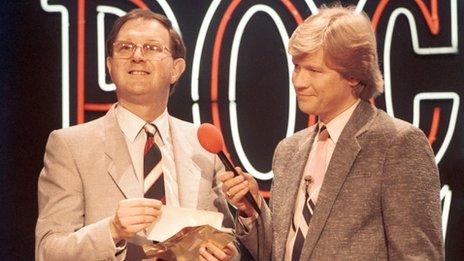BBC comedy producer Michael Hurll dies
- Published

Michael Hurll, who produced The Two Ronnies and established the British Comedy Awards, has died aged 75.
The TV executive was also responsible for Top Of The Pops from 1980 to 1987, and worked on The Eurovision Song Contest and The Royal Variety Show.
He died peacefully on Tuesday morning, his son said in a statement.
TV presenter Mike Smith paid tribute to his former colleague, saying he was "a mentor to me and many. He let us be us. And he led like a General."
Radio 2 presenter Janice Long called him "one of the most influential producers in television", who was "warm, lovely and immensely talented".
Jonathan Harvey, a writer on Coronation Street who penned BBC comedy Gimme Gimme Gimme, said: "RIP Legendary producer Michael Hurll. Lovely man who was always so nice to me and had me on comedy awards panel for ten years. A gent."
Born in 1936, Hurll grew up in Twickenham and was educated at St Paul's School in south-west London.
He joined the BBC in 1956, having already directed fellow pupil Jonathan Miller in a school revue.
His first job was as a lowly "call boy" (now known as a runner), alongside fellow newcomer Michael Winner, bringing on guests for the Billy Cotton Band Show.
Radio 2 presenter Janice Long: "He was warm, lovely and immensely talented."
He quickly progressed through the ranks, and ended up producing and directing a host of light entertainment shows, including Seaside Special, The Little and Large Show, It's Cliff Richard and the last Peter Cook and Dudley Moore show.
On Top Of The Pops, he was credited with introducing a "party atmosphere" to proceedings, boosting the programme's ratings during its dayglo '80s heyday.
"He was a fantastic producer, who brought excitement to Top Of The Pops," said Long, who presented the show during Hurll's tenure.
"Michael employed me as the first woman to present Top Of The Pops, and he trusted me to do the live ones, as well," she said.
"He was really, really good to me. When I lost my job at Radio 1 for being pregnant and not being married, he still continued to use me on Top Of The Pops."
But, although Hurll held fond memories for the chart show, he was pragmatic about its fate in the first years of the 21st Century.
"Once something's... running out of steam, nothing you do on God's earth is going to make that get any more viewers," he told the BBC in 2003. "Nothing at all."
'Dearly beloved'
Despite his numerous successes, Hurll was modest about his role, telling The Independent in 2007: "We're not producers. We're psychologists".
"The great trick is when you want to tell the talent something they don't want to hear, you always say 'We don't think it would be a good idea...'. It never fails."
Behind the scenes, he wasn't always complimentary about his colleagues.
Bob Hope was "the nastiest man I've ever worked with," he told comedy website Chortle.
Jerry Lewis, too, was "a nasty piece of work", while Rod Hull was "the most miserable, nastiest man you ever met".
He deemed comedy duo Cannon and Ball "as funny as a cow's crotch".
But he held Ronnie Barker in the highest esteem, praising the rhythm of his scripts, and the "fountain of knowledge" he passed on to his colleagues.
"You [always] knew you would laugh," he told the BBC when Barker died in 2005. "It was good honest comedy in the old music hall tradition."
Hurll left full-time employment at the BBC in the 1980s, although he continued to produce shows on a freelance basis - including Noel Edmonds' ill-fated Late, Late Breakfast Show, in which a member of the public was killed during rehearsals for a bungee jump stunt.
He created the British Comedy Awards in 1990, and the show continues to this day.
It has earned its fair share of controversy over the years, including Julian Clary's notorious, x-rated comments about then-Chancellor Norman Lamont, which effectively led to Clary being blacklisted from mainstream TV for several years.
Towards the end of his life, Hurll suffered from Parkinson's disease, but continued to work.
In a statement announcing his death, the producer was described as: "Dearly loved husband of Sandra, father of Jeremy (deceased) and Simon, father-in-law of Louise and Isobel, and grandfather of Sophie and Alexander."